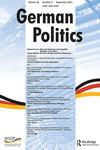Housing Policy Reframed? How Conceptual Framing Affects Support for Social Housing Policies in Germany
IF 2.1
3区 社会学
Q2 POLITICAL SCIENCE
引用次数: 2
Abstract
Housing policy is a growing problem in many countries. Three online experiments were conducted to test framing effects in the context of housing policies in Germany. In experiment 1 (N = 303), urban growth was either described as ‘rural exodus’ or ‘influx’ of the rural population into urban areas. Experiment 2 (N = 300) focused on framing effects in the current expropriation debate in Germany. A reacquisition policy of private housing was either framed as a measure of ‘expropriation’ or ‘repurchase’. In experiment 3 (N = 311), a vacancy taxation was either labelled to ‘punish’ or ‘overcome’ actual problems with housing shortage. A mini meta-analysis across all three studies shows that conceptual framing affects policy support in a consistent way. The data supports our hypotheses that framing has the power to influence mental representations of policy and solutions. Moreover, moderation analyses were conducted to systematically test the influence of political ideology and perceived issue relevance on framing effects. Results indicate that participants’ ideological self-placement partly affects the effectiveness of linguistic framing in some contexts. Thus, the results expand existing knowledge about the effectiveness of political framing, by making visible not only the possibilities but also the boundaries of framing strategies.住房政策重新制定?概念框架如何影响对德国社会住房政策的支持
住房政策在许多国家是一个日益严重的问题。进行了三项在线实验,以测试德国住房政策背景下的框架效应。在实验1(N = 303),城市增长被描述为“农村人口外流”或农村人口“涌入”城市地区。实验2(N = 300)集中讨论了德国当前征用辩论中的框架效应。私人住房的重新征用政策要么被界定为“征用”措施,要么被定义为“回购”措施。在实验3(N = 311),空置税被贴上了“惩罚”或“克服”住房短缺实际问题的标签。对所有三项研究的一项小型荟萃分析表明,概念框架以一致的方式影响政策支持。这些数据支持了我们的假设,即框架有能力影响政策和解决方案的心理表征。此外,还进行了适度分析,系统地测试了政治意识形态和感知问题相关性对框架效应的影响。研究结果表明,在某些语境中,参与者的意识形态自我定位在一定程度上影响了语言框架的有效性。因此,研究结果不仅展示了制定战略的可能性,而且展示了制定策略的边界,从而扩展了关于政治框架有效性的现有知识。
本文章由计算机程序翻译,如有差异,请以英文原文为准。
求助全文
约1分钟内获得全文
求助全文

 求助内容:
求助内容: 应助结果提醒方式:
应助结果提醒方式:


